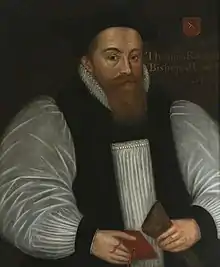Thomas Ravis
Thomas Ravis (c. 1560 – 14 December 1609) was a Church of England bishop and academic. He was among those engaged in translating the King James Bible.
Thomas Ravis | |
|---|---|
| Bishop of London | |
 | |
| Church | Church of England |
| Diocese | Diocese of London |
| Elected | 18 May 1607 |
| Installed | 2 June 1607 |
| Term ended | 1609 (death) |
| Predecessor | Richard Vaughan |
| Successor | George Abbot |
| Other posts | Bishop of Gloucester 1604–1607 Dean of Christ Church, Oxford 1596–1607 |
| Orders | |
| Ordination | 1582 |
| Consecration | 17 March 1605 |
| Personal details | |
| Born | c. 1560 Old Malden, Surrey |
| Died | 14 December 1609 |
| Buried | St Paul's Cathedral, London |
| Nationality | English |
| Denomination | Anglican |
| Profession | Academic |
| Education | Westminster School |
| Alma mater | Christ Church, Oxford |
Early life
Ravis was born at Old Malden in Surrey, probably in 1560, and educated at Westminster School. He was elected, on the recommendation of Lord Burghley, to Christ Church, Oxford in 1575, but the Dean and Chapter declined to admit him on the grounds that there was no room, until Burghley remonstrated with them. He gained a BA on 12 November 1578 and an MA on 3 March 1582, proceeding to a bachelor's divinity degree in 1589 and a divinity doctorate in 1595.
Priestly career
Ravis took holy orders in 1582 and preached around Oxford for some time. On 17 April 1588 he was elected a proctor and in July 1596 and again in July 1597 was chosen Vice-Chancellor of the University of Oxford.[1] In 1591 he was admitted to the rectory of Merstham, Surrey, and from 27 December of the same year until May 1598 was vicar of All Hallows, Barking. From February 1593 till 1607 he was a prebendary of Westminster, and from 1596 until 1605 an authoritarian Dean of Christ Church.[2] As Dean he commuted the commons allowance for food into monetary form, of two shillings a week. Some of those who resisted this innovation he expelled, others he sent before the council, and others he imprisoned.
On 7 July 1598 he became vicar of Islip, and in the following October vicar of Wittenham Abbas, Berkshire.[3] He was one of the six deans who attended the Hampton Court Conference in 1604, and later supplied notes for William Barlow's account, the Sum and Substance of the Conference. He was then involved in the subsequent creation of the King James Bible, being appointed one of the Oxford committee deputed to translate part of the New Testament. Also in that year, he was elected prolocutor of the lower house of Convocation.
Episcopal career
In October 1604 Ravis was appointed Bishop of Gloucester and consecrated on 17 March 1605; he was allowed to hold in commendam with his bishopric the deanery of Christ Church, his Westminster prebend, and the parsonages of Islip and Wittenham. At Gloucester he improved the Bishop's Palace. On 18 May 1607 Ravis was translated to the episcopal see of London and installed as Bishop of London on 2 June. He was intolerant of all nonconformity. Ravis died on 14 December 1609, and was buried in the north aisle of St Paul's Cathedral.
Notes
- "Archived copy". Archived from the original on 21 May 2008. Retrieved 5 August 2008.CS1 maint: archived copy as title (link)
- http://www.british-history.ac.uk/report.aspx?compid=35322
- This list associates "Abbots Wittenham" with Little Wittenham. "Archived copy". Archived from the original on 7 July 2010. Retrieved 27 August 2010.CS1 maint: archived copy as title (link). Retrieved 27 August 2010.
References
![]() This article incorporates text from a publication now in the public domain: "Ravis, Thomas". Dictionary of National Biography. London: Smith, Elder & Co. 1885–1900.
This article incorporates text from a publication now in the public domain: "Ravis, Thomas". Dictionary of National Biography. London: Smith, Elder & Co. 1885–1900.
| Academic offices | ||
|---|---|---|
| Preceded by William James |
Dean of Christ Church, Oxford 1596–1605 |
Succeeded by John King |
| Church of England titles | ||
| Preceded by Godfrey Goldsborough |
Bishop of Gloucester 1604–1607 |
Succeeded by Henry Parry |
| Preceded by Richard Vaughan |
Bishop of London 1607–1609 |
Succeeded by George Abbot |